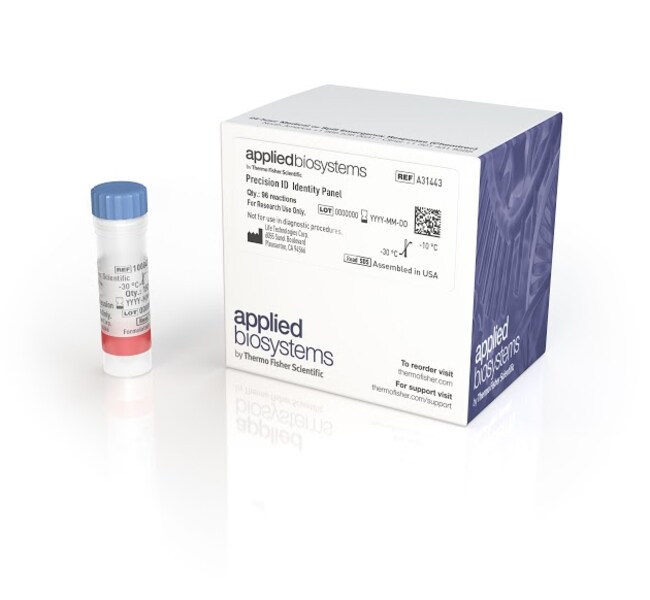
The Applied Biosystems Precision ID Identity Panel is one of the first next-generation sequencing (NGS) solutions for human identification that uniquely identifies pristine or degraded samples. The multiplexed panel of SNPs provides discrimination of individuals similar to STR genotype match probabilities used by forensic analysts (between 1x10-31 and 6x10-35).
High discrimination power is achieved by using 34 upper Y-Clade SNPs and 90 autosomal SNPs that have high heterozygosity and low fixation index (Fst) as described in publications by Dr. Kenneth Kidd from Yale University and the SNPForID Consortium (1-3). The panel design has been optimized for use with degraded or challenging forensic samples using only 1 ng of starting DNA input, although acceptable performance has been observed with sub-nanogram input quantities as low as 100 pg. The autosomal markers have an average amplicon length of 132 nucleotides and the Y-markers are 141 nucleotides in length on average. Using a small sample input of as little as 1 ng of DNA, you can go from sample extraction to genotypes in less than a two days using the Precision ID NGS System and Converge Software for analysis.
Simplicity
• Small amplicons enable better recovery with degraded samples
• As little as 100 pg of input
• Automated library and template preparation using the Ion Chef System
Scalability
• Multiple chip formats to meet a range of sample throughput requirements
• Ability to multiplex up to 384 samples*
Speed
• Less than 45 minutes of hands-on time for a DNA-to-data targeted sequencing workflow*
• Total sample-to-data time of less than 2 days*
NOTE: The Precision ID Identity Panel provides sufficient material to perform 96 reactions using the manual Precision ID Library kit (Cat. No. A26435) or 32 reactions using the automated Precision ID DL8 Library Kit (Cat. No. A33212).
* Using the Precision ID NGS System for Human Identification
References:
1. Pakstis, AJ, Speed, WC, Fang, R, Hyland, FC, Furtado, MR, Kidd, JR, and Kidd, KK. (2010) SNPs for a universal individual identification panel. Human Genetics 127(3), 315-324.
2. Phillips, C, Fang, R, Ballard, D, Fondevila, M, Harrison, C, Hyland, F, et al. (2007) Evaluation of the Genplex SNP typing system and a 49plex forensic marker panel. Forensic Science International: Genetics 1(2), 180-185.
3. Karafet, TM, Mendez, FL, Meilerman, MB, Underhill, PA, Zegura, SL, and Hammer, MF. (2008) New binary polymorphisms reshape and increase resolution of the human Y chromosomal haplogroup tree. Genome Research 18(5), 830-838.
| Code | Description |
|---|---|
| A25643 | Catalog Number: A25643 |

